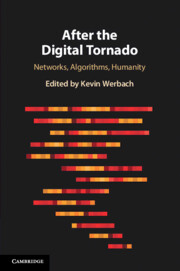Kevin Werbach (editor) is a professor of Legal Studies and Business Ethics at the Wharton School, University of Pennsylvania. His work examines the intersection of business, policy, and emerging technologies. Werbach co-led the review of the Federal Communications Commission for the Obama Administration’s Presidential Transition Team. He is the coauthor of For the Win: How Game Thinking Can Revolutionize Your Business (Wharton Digital Press, 2012, with Dan Hunter), and author of The Blockchain and the New Architecture of Trust (MIT Press, 2018). Nearly 500,000 students have enrolled in his Coursera massive open online course, and he was named Wharton’s first-ever “Iron Prof.” Previously he served as Editor of Release 1.0: Esther Dyson’s Monthly Report, and as FCC Counsel for New Technology Policy, where he wrote Digital Tornado, the first comprehensive analysis of the Internet’s implications for communications policy.
Julie Cohen is the Mark Claster Mamolen Professor of Law and Technology at the Georgetown University Law Center. She teaches and writes about copyright, surveillance, privacy and data protection, and the governance of information and communication networks. She is the author of Configuring the Networked Self: Law, Code and the Play of Everyday Practice (Yale University Press, 2012), Between Truth and Power (Oxford University Press, 2019), and numerous journal articles and book chapters, and a coauthor of Copyright in a Global Information Economy (Aspen Law & Business, 4th ed., 2015). Professor Cohen is a member of the Advisory Board of the Electronic Privacy Information Center.
Brett Frischmann is the Charles Widger Endowed University Professor in Law, Business and Economics at Villanova University. An expert on Internet and intellectual property law, he is an affiliated scholar of the Stanford Center for Internet and Society, and a trustee for the Nexa Center for Internet & Society, Politecnico di Torino. Frischmann’s books include Infrastructure: The Social Value of Shared Resources (Oxford University Press, 2012); Governing Knowledge Commons (Oxford University Press, 2014, with Michael Madison and Katherine Strandburg); Governing Medical Knowledge Commons (Cambridge University Press, 2017, with Michael Madison and Katherine Strandburg); and Being Human in the 21st Century: How Social and Technological Tools Are Reshaping Humanity (Cambridge University Press, 2018, with Evan Selinger).
Kartik Hosanagar is the John C. Hower Professor of Technology and Digital Business and a Professor of Marketing at The Wharton School of the University of Pennsylvania. Kartik’s research work focuses on the digital economy, in particular, the impact of analytics and algorithms on consumers and society, Internet media, Internet marketing and e-commerce. He has been recognized as one of the world’s top forty business professors under 40, and he is a ten-time recipient of teaching excellence awards at the Wharton School. Hosanagar cofounded Yodle Inc, a venture-backed firm acquired by Web.com. He has been an investor, advisor, or board member to startups including Milo (acquired by eBay) and Monetate.
Chris Marsden is Professor of Internet Law at the University of Sussex. He is author of five monographs on Internet law: Network Neutrality: From Policy to Law to Regulation (Manchester University Press, 2017), Regulating Code (MIT, 2013, with Ian Brown), Internet Co-Regulation: European Law, Regulatory Governance and Legitimacy in Cyberspace (Cambridge University Press, 2011), Net Neutrality: Towards a Co-Regulatory Solution (Bloomsbury, 2010), and Codifying Cyberspace (Routledge/Cavendish, 2007 with D. Tambini and D. Leonardi). He is also author-editor of two interdisciplinary Internet policy books.
Viktor Mayer-Schönberger is Professor of Internet Governance and Regulation at the Oxford Internet Institute. He is also a faculty affiliate of the Belfer Center of Science and International Affairs at Harvard University. He has published ten books, including the international bestseller Big Data (HMH, 2013, with Kenneth Cukier) and the awards-winning Delete: The Virtue of Forgetting in the Digital Age (Princeton University Press, 2009). He chaired the Rueschlikon Conference on Information Policy in the New Economy, and in 2014 he received a World Technology Award in the law category. Earlier in his career, he was voted Top-5 Software Entrepreneur in Austria in 1991 and Person of the Year for the State of Salzburg in 2000.
Deirdre Mulligan is an associate professor in the School of Information at UC Berkeley, and a faculty Director of the Berkeley Center for Law & Technology. She is the coauthor of Privacy on the Ground: Driving Corporate Behavior in the United States and Europe (MIT, 2015, with Kenneth Bamberger), and in 2016 was corecipient of the International Association of Privacy Professionals Leadership Award. Mulligan is a member of the National Academy of Science Forum on Cyber Resilience, Chair of the Board of Directors of the Center for Democracy and Technology, a founding member of the standing committee for the AI 100 project, and a founding member of the Global Network Initiative.
Tim Wu is a professor at Columbia Law School, and a contributing opinion writer for the New York Times. He is author of the books The Master Switch(Knopf, 2010), The Attention Merchants(Knopf, 2016), and Who Controls the Internet?(Oxford University Press, 2008, with Jack Goldsmith), along with Network Neutrality, Broadband Discrimination, and other works. In 2013 he was named one of America’s 100 Most Influential Lawyers, and in 2017 he was named to the American Academy of Arts and Sciences.
Shoshana Zuboff is the Charles Edward Wilson Professor of Business Administration at the Harvard Business School (emerita). Her career has been devoted to the study of the rise of the digital; its individual, organizational, and social consequences; and its relationship to the history and future of capitalism. Her new work includes The Age of Surveillance Capitalism: The Fight for a Human Future at the New Frontier of Power, published in 2019 by Public Affairs in the US and Eichborn in Germany. In 2006, strategy+business named Professor Zuboff among the eleven most original business thinkers in the world. Author of the celebrated classic In the Age of the Smart Machine: The Future of Work and Power (Basic Books, 1988), Professor Zuboff has been called “the true prophet of the information age.”

